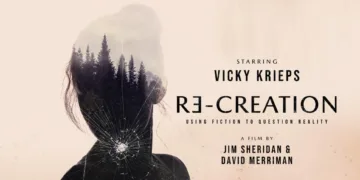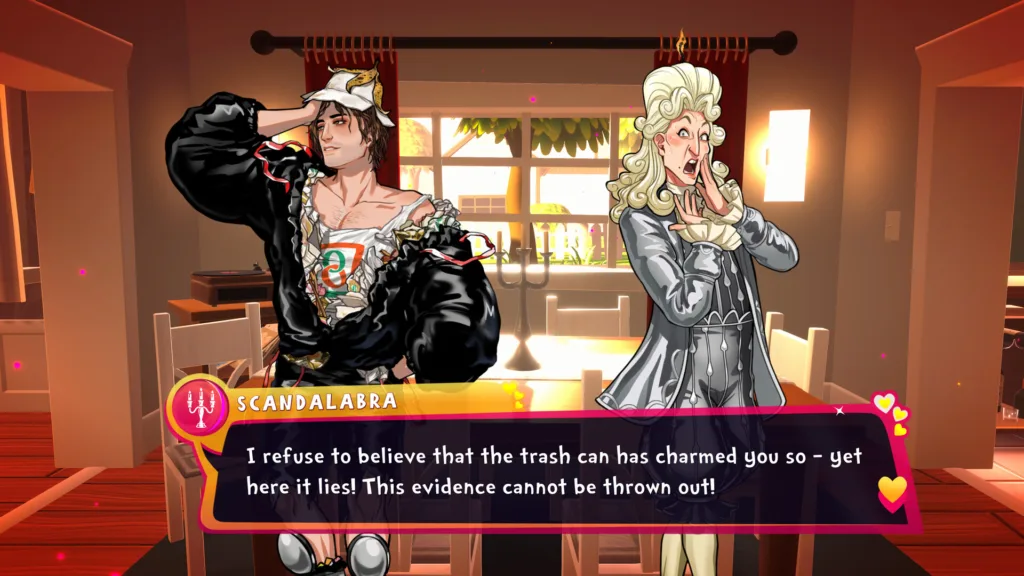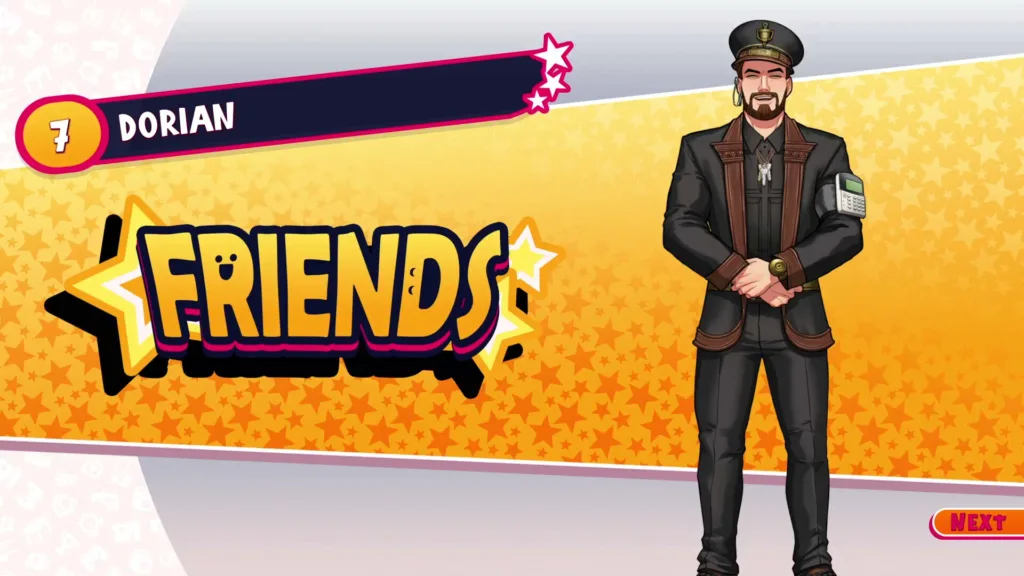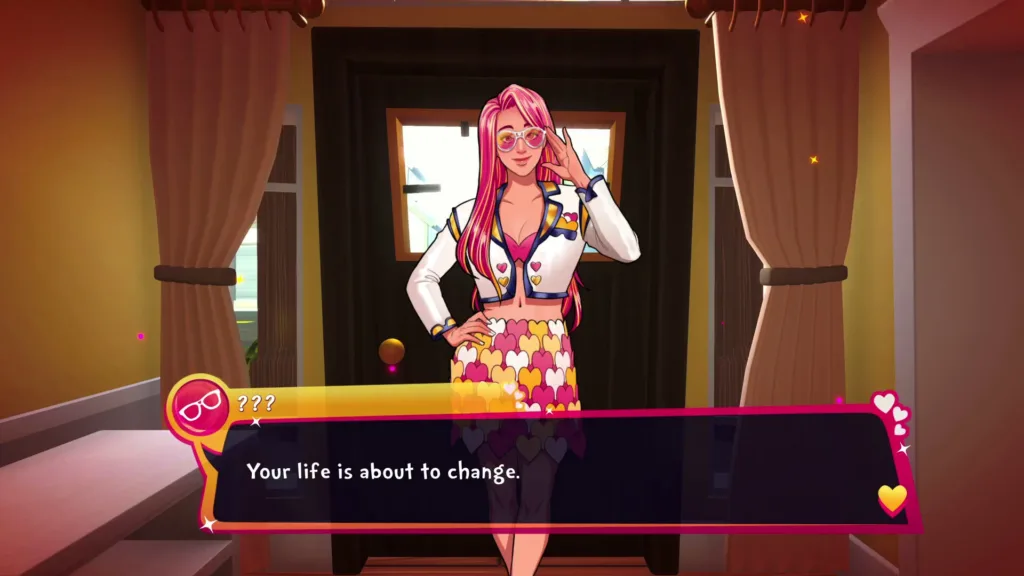Have you ever looked at your plush towels and thought, “you’re my type,” or felt your air conditioner just understands you on a deep, emotional level? The dating simulator Date Everything! takes this bizarre thought exercise and builds an entire world around it.
The game begins with a distinctly modern tragedy: your character, armed with a fresh BFA in Customer Service, is promptly made redundant by an AI on the first day of a new tech job. Before despair can set in, a drone delivers a mysterious package containing the “Dateviators,” a pair of sunglasses that changes your perspective on domestic life.
Putting them on reveals that your home is populated by “inanimates,” the fully personified, sentient, and very dateable forms of your furniture and belongings. What follows is not a guided story with a few select partners, but a freeform social sandbox. The core activity is to interact with the 100 distinct personalities now available for a chat.
You can pursue romance with the piano, forge a friendship with the refrigerator, or start a bitter rivalry with a sassy bobby pin. The game presents its absurd concept with comedic flair, but it quickly becomes apparent that this is not a simple gag. It treats its characters and their stories with an unexpected earnestness.
The Rules of Household Attraction
Beneath the chaotic premise, Date Everything! operates on a familiar time-management structure seen in social sims like the Persona series. Your time is a resource. Each day, you can initiate conversations with five different inanimates before the Dateviators need to recharge, forcing you to sleep and advance to the next day.
The loop involves exploring your home in three dimensions, pointing the glasses at an object, and activating them to “DATE”—an acronym for Directly Acknowledging a Thing’s Existence. This action begins your relationship with anything from the grandfather clock to a lonely dust bunny.
How these relationships develop is dictated by a system of branching dialogue choices. Each conversation pushes you toward one of three outcomes: Love, Friendship, or Hate. Successfully reaching a relationship milestone with a character rewards you with points for your “SPEC” stats: Smarts, Poise, Empathy, Charm, or Sass. This system functions almost identically to the social stats in Persona 5; raising your Charm might unlock a flirtatious line, while high Empathy could open a more understanding path. It’s a classic stat-gating mechanic that adds a light RPG progression layer to the visual novel foundation.
These SPEC points serve a greater purpose beyond just unlocking dialogue. The main long-term objective is to “realize” the inanimates, which means helping them become fully human. Doing this for any given character requires you to first raise their preferred SPEC stats to a specific threshold.
This transforms the act of socializing into a strategic puzzle. If you want to realize the stoic Wall, you may need to farm Poise points by befriending the dapper dining room chairs first. This system encourages you to engage with the entire cast, as different relationship endings and even full-playthrough achievements exist for those who manage to charm—or alienate—all 100 residents.
The Soul of the Household
A game with 100 dateable characters lives or dies by the strength of its cast, and this is where Date Everything! places all its chips. The sheer variety is stunning. The roster includes a handsome towel named Tyrell who dreams of seeing the world as a beach towel, a French toilet named Jean-Loo Pissoir who fashions himself a “crapper” (a cool rapper), a gangster-obsessed bobby pin who runs scams around the house, and an air fryer, Friar Errol, who preaches the gospel of the oil-free kitchen.
The game’s imagination extends beyond simple appliances to personify abstract concepts like the water in the pipes, the air in the rooms, and even the player’s own sense of dread. The act of finding a new personality carries the same thrill of discovery as finding a rare creature in a monster-collecting game; the in-game “Date-A-Dex” that tracks your finds feels like a direct nod to that design philosophy.
This creativity is matched by a thoughtful and often hilarious visual design. The hand-drawn characters are not just attractive figures; their appearances are intrinsically linked to the objects they represent. An Italian cabinet named Cabrizzio wears a jacket whose patterns mimic wood paneling and whose lapels look like door handles. The aforementioned toilet, Jean-Loo, wears a plunger as a hat and wields another as a microphone. This level of detail in the art direction ensures that every new character reveal is a delightful surprise, a small puzzle to figure out how their design reflects their origin.
The characters are brought to life by a phenomenal collection of voice talent. This is no accident; developer Sassy Chap Games was co-founded by industry veterans like Ray Chase and Robbie Daymond, and their passion for the craft is evident. The game is a showcase for actors to play wildly inventive roles.
You’ll hear Ben Starr (Final Fantasy XVI) voicing every door in the house, Matt Mercer giving gravitas to a D20, and Robbie Daymond performing a full-fledged Elvis impression as Johnny Splash, the shower. Every one of the 100 characters is fully voiced, and the cast delivers each absurd or heartfelt line with a commitment that sells the entire premise.
What elevates the cast beyond a simple collection of curiosities is that they exist in a community with its own history. These characters have relationships with one another that are entirely separate from the player. The washer and dryer, Washford and Drysdale, are a bickering couple whose relationship is on the rocks.
The clothes hamper and a pile of dirty clothes are star-crossed lovers. Uncovering these little dramas makes the house feel like a living, breathing space, much like discovering the hidden relationships between villagers in a game like Stardew Valley. The world doesn’t just revolve around you; you’ve simply been given a key to observe a society that was already there.
More Than Just a Punchline
A game with a premise this absurd could easily lean into cynical, mean-spirited parody. It’s a pleasant surprise that the writing in Date Everything! is its most earnest feature. While the script is brimming with puns, the humor comes from a place of affection for its characters, not mockery of the dating-sim genre. It avoids the trend of ironic visual novels that use the format as a setup for a punchline or a horror twist.
The game’s sincerity is reinforced by the protagonist’s dialogue options, which often feel like things a real person would say, grounding the bizarre circumstances in a relatable perspective. The tone respects both the characters and the player, inviting you to laugh with the game, not at it.
Beneath the humor, many of the character arcs have surprising substance. These are not one-dimensional jokes; they are written as individuals with their own fears and aspirations. Johnny Splash, the shower, has a heartfelt desire to become a singing superstar. Many storylines touch upon themes of self-respect and what it means to be in a healthy relationship. The narrative also makes a deliberate effort at inclusion.
The cast represents a wide array of backgrounds, body types, and personalities, from a magnificent Nigerian piano named Keyes to a protective Mexican blanket called Mateo Manta. This thoughtful approach is crystallized in the game’s content warning system, where a character pops up to offer a chance to skip potentially upsetting scenes, a feature that shows a deep consideration for the player’s experience.
However, the game’s narrative ambition is also its primary weakness. Committing to 100 distinct character arcs is a monumental task, and the writing cannot maintain depth across the entire roster. For every multipart, dramatic storyline, there are several others that feel lightweight and rushed. Some characters reveal their entire personality in one or two conversations before their story concludes with a binary choice to be friends or lovers.
The result is a narrative that is a mile wide but often only an inch deep. The focus on breadth means many characters feel more like delightful sketches than fully developed portraits, creating an experience that favors the sheer joy of variety over the satisfaction of a few deeply realized storylines.
Cracks in the Foundation
For all its charm, the massive scope of Date Everything! creates some significant structural problems. The joyful discovery of the early game eventually gives way to a monotonous grind. As the 20-hour mark approaches, the need to farm SPEC points to advance certain storylines means you are forced to spend your limited daily interactions on characters you may find uninteresting or even annoying.
This transforms a game of heartfelt connection into a mechanical task list. The process can become especially tedious with characters who move around the house, like Abel the table or Bobby the bobby pin. Hunting for the correct instance of a character to trigger the next story beat feels less like a fun scavenger hunt and more like housework.
The game’s choice system also reveals some frustrating limitations. While player agency is central, dialogue options can be unforgiving. A single misread comment, intended as a joke, can abruptly lock you onto a “Hate” path with no opportunity for recourse. This rigid design feels jarring in a game that otherwise encourages experimentation. Narrative inconsistencies further break the immersion.
A character who supposedly despises you might show up as a cheerful participant in another’s questline, seemingly forgetting your rivalry. More strangely, the game almost completely ignores the fact that you might be romantically involved with dozens of characters simultaneously. The lack of jealousy or even acknowledgment from partners feels like a missed opportunity for drama and makes the relationships feel less consequential than those in games like Dragon Age or Baldur’s Gate 3, where polyamory is often a deliberate and acknowledged choice.
Finally, the experience is hampered by technical issues, particularly on the Nintendo Switch. Players have reported frequent bugs, including repeated dialogue scenes, interactive objects failing to respond, and full game crashes that require a reload. While the autosave is frequent, these interruptions disrupt the flow of the game.
The user interface also lacks some basic quality-of-life features that are standard in the visual novel genre, such as a text log to review past conversations or an auto-play function. Coupled with annoyances like a loud, grating beep in the Date-A-Dex menu, these small frustrations accumulate, tarnishing an otherwise delightful experience.
The Final Assessment
Date Everything! is a game built almost entirely on the power of its premise and the charm of its characters. Its most potent moments come from the simple, delightful act of discovery—of firing the Dateviators at a new object and being greeted by another inventive design and an infectiously committed vocal performance.
This boundless creativity is the game’s greatest asset and the primary reason to play. The experience is a testament to how far a heartfelt and humorous concept can carry a game, even when its mechanical underpinnings show strain.
The decision to include 100 separate storylines is both the game’s most ambitious feature and the source of its biggest problems. The resulting repetition and narrative shallowness are not so much a failure of execution as they are an unavoidable consequence of that massive scope. The commendable effort to give every object a voice results in an experience that favors breadth over depth.
For this reason, the game is best suited for players who are looking for a lighthearted and warm experience to be enjoyed in short bursts. It is a perfect pick-me-up, filled with humor and sincerity. Players who prioritize character originality and clever writing above intricate mechanics or the complex, branching plots found in other modern RPGs will find a truly special and memorable game here.
The Review
Date Everything!
Date Everything! is an absolute triumph of creativity and charm. Its brilliantly absurd premise is brought to life by a memorable cast, gorgeous art, and some of the best voice acting in any game today. While its massive ambition comes at the cost of repetitive late-game mechanics and some shallow storylines, the sheer joy of discovering each new personality makes it an unforgettable experience. It’s a hilarious, warm, and inventive game that confidently stands out as one of the most original titles in recent years.
PROS
- A brilliantly creative and charming central concept.
- 100 unique and wonderfully designed characters.
- Superb, industry-leading voice acting.
- Genuinely funny and heartfelt writing.
CONS
- Gameplay becomes repetitive and grindy in the late stages.
- Many character storylines feel shallow due to the massive cast.
- Frustrating design choices and narrative inconsistencies.
- Technical bugs and performance issues on some platforms.




















































